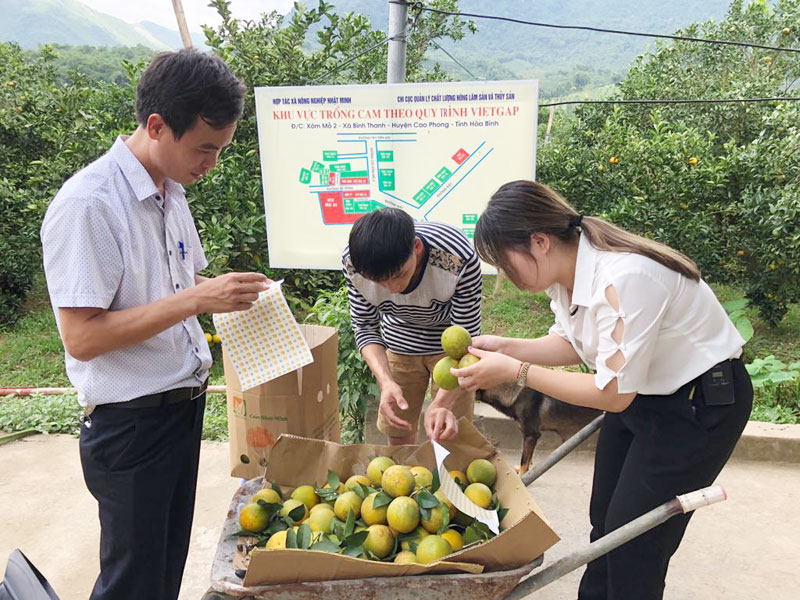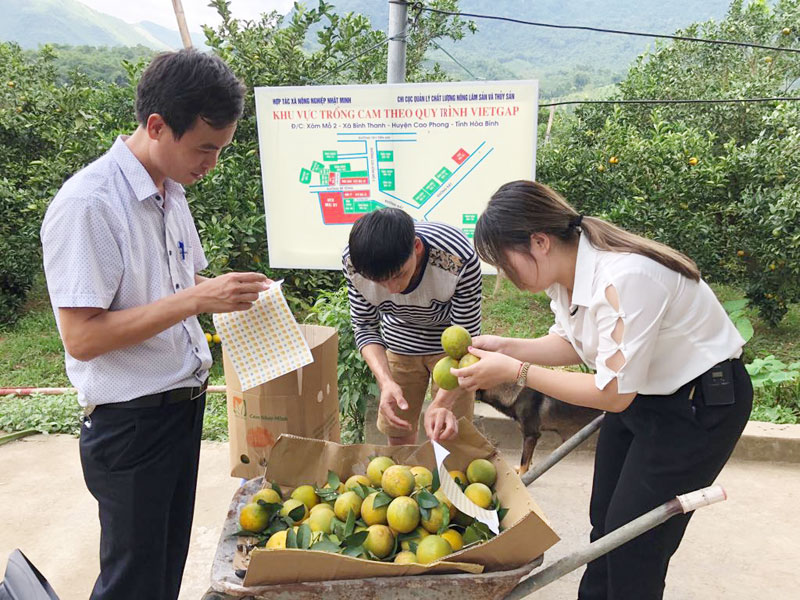
(HBO) - With the increasing sense of responsibility, Cao Phong orange growers in Hoa Binh province have actively applied good agricultural practices to produce clean products, for the purpose of quality and consumer health. The orange zone ensures food safety, thereby increasing.

Nhat Minh Agriculture and Service Cooperative
in Binh Thanh Commune, Cao Phong district, Hoa Binh province has a good market for its products thanks to the quality of oranges
meeting VietGAP standards.
Currently, Cao Phong district has 1,018.34 ha
of oranges that are produced according to VietGAP standards with 759 households
participating. Of which, in 2014, there were 15 households participating in
VietGAP certified area of 46.97 ha. In 2015, 100 households participated in
an area of 59.5 ha. In 2016, 120 households participated with an area of
141.89 ha. In 2017, there were 86 households participating in an area of
164.6 hectares. In 2018, the area of orange certified VietGAP increased
sharply, reaching 616.7 hectares. In 2019, VietGAP certified orange area
continues to increase by 45.9 hectares.
Mr. Bui Dang Khoa, Head of Agriculture and
Rural Development Division of Cao Phong district, Hoa Binh province said:
Producing oranges according to VietGAP standards helps the price to increase,
profits and product consumption of producers are more and more stable, while
forming the value chain of citrus fruit.
The Cao Phong district People's Committee has assigned the district DARD to
coordinate with the People's Committees of communes, towns, enterprises and
cooperatives to organize the implementation of the project to support Cao Phong
orange production and consumption. From 2017 to now, about 350 households with
400 ha of citrus fruit, 2 businesses and cooperatives have been supported.
Participants received technical assistance, agricultural materials and signed
product off-take contracts with enterprises.
According to data from the Hoa Binh Provincial Party Committee, the industrial production index for the first six months of 2025 is estimated to have increased by 20% compared to the same period last year. This marks the highest year-on-year growth rate for this period since 2020.
In the first six months of 2025, Hoa Binh province’s export turnover was estimated at 1.145 billion USD, marking an 18.11% increase compared to the same period in 2024. Import turnover was estimated at $ 804 million, a 17.15% increase, which helped the province maintain a positive trade balance.
The lives of the ethnic minority farmers in Tan Lac district have gradually improved thanks to the new directions in agricultural production. This is a testament to the collective strength fostered through the professional associations and groups implemented by various levels of the district’s Farmers’ Union.
With the motto the "product quality comes first,” after nearly one year of establishment and operation, Muong village’s Clean Food Agricultural and Commercial Cooperative, located in Cau Hamlet, Hung Son Commune (Kim Boi district), has launched reputable, high-quality agricultural products to the market that are well-received by consumers. The products such as Muong village’s pork sausage, salt-cured chicken, and salt-cured pork hocks have gradually carved out a place in the market and they are on the path to obtaining the OCOP certification.
In the past, the phrase "bumper harvest, rock-bottom prices" was a familiar refrain for Vietnamese farmers engaged in fragmented, small-scale agriculture. But today, a new spirit is emerging across rural areas of Hoa Binh province - one of collaboration, organisation, and collective economic models that provide a stable foundation for production.
Maintaining growing area codes and packing facility codes in accordance with regulations is a mandatory requirement for agricultural products to be eligible for export. Recently, the Department of Agriculture and Environment of Hoa Binh province has intensified technical supervision of designated farming areas and packing facilities to safeguard the "green passport" that enables its products to access international markets.



